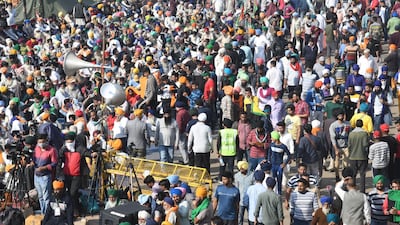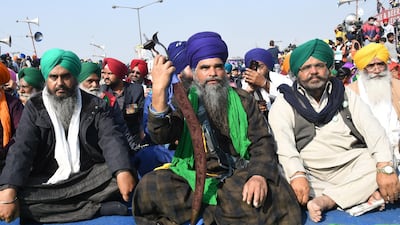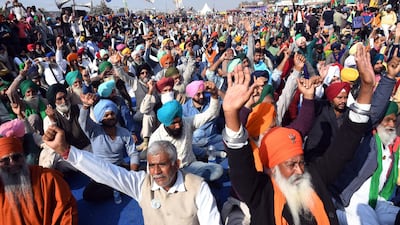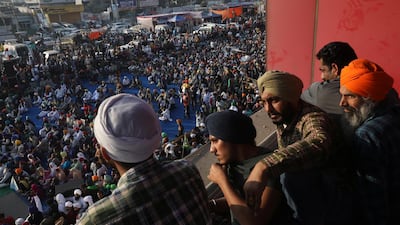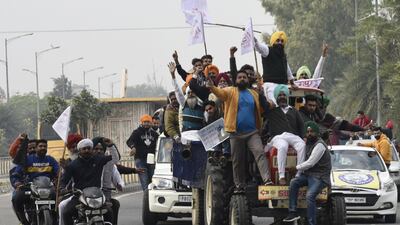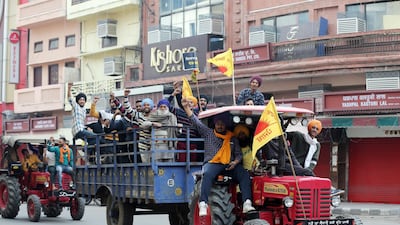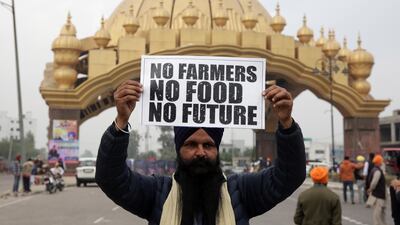For more than two weeks, tens of thousands of Indian farmers have camped out on several key motorways leading into the capital, New Delhi, to demand Prime Minister Narendra Modi repeal farming laws they claim will wreck their livelihoods.
What is the new legislation?
Mr Modi’s Bharatiya Janata Party government passed three new pieces of legislation in September, despite strong resistance by opposition groups and demands for negotiations.
One dealt with the sale of produce in the free market, another with contract farming and the last with deregulating government control on food commodities, including cereals, pulses and oil, for storage and sale.
Mr Modi billed the new laws – which were rushed through parliament – as a landmark.
Why are farmers protesting?
Farmers say the laws are an attempt to privatise the agriculture sector, which employs half the country's 1.3 billion population, directly and indirectly.
Those protesting say their main concern is that the government will scrap the minimum support price – a pricing system in state-run markets that offers guaranteed rates – including Punjab’s chief crop of wheat and paddy.
About 75 per cent of Punjab's population relies on agriculture, but most are small landowners, owning an average 1.3 hectare per smallholding.
Over many decades farmers faced economic distress as a result of stagnant crop prices, steep production costs and precarious weather.
About 300,000 farmers died by suicide over the past 30 years. In 2019 alone, at least 10,281 farmers ended their lives, according to government data,
Dwindling incomes and insecurity forced farmers to stage protests before, but the most recent flare-up is the biggest mobilisation yet against Mr Modi's government, which has promised the reforms would double their income by 2022.
How long has this been going on?
The farmers, mainly from northern Punjab state – often called the breadbasket of India with 60 per cent of the country's wheat produce – have been gathered near Delhi’s entry points since November 26.
Carrying mattresses, blankets and food enough for six months on tractors, the protest groups were barred by police, who used teargas and water cannon to stop them from entering the capital.
Since then, thousands more have joined them in the tent cities on the motorways, where community kitchens serve food while protesters sing, eat and sleep in tractors and under the open sky in chilling cold.
Is there hope of a resolution?
There have been six rounds of unsuccessful talks between the government and more than a dozen protesting farmer unions.
Late on Tuesday, talks between Home Minister Amit Shah and leaders from the farming community were inconclusive, but the government afterwards presented a written offer to farmers with proposed amendments.
On Wednesday, farmers rejected the government's draft proposal terming it vague and declared a nationwide strike on December 14.
Unions are yet to respond to the proposal amid speculation that some groups in the movement have agreed to the government proposal.
"Our movement will continue and we will definitely take back something from the government – be it bullets or a peaceful solution," said Chanda Singh, a farmer leader who was part of the talks.
Challenges for Modi
Mr Modi’s government is facing one of the biggest farmers’ agitations in the country's history.
On Tuesday, several farmers' organisations, transport and even bank unions observed a nationwide shutdown to show solidarity with the farmers’ cause. They have won support of political parties, including Congress.
With the protests dragging on, experts say the agitation could snowball into a popular movement against the government and dent Mr Modi’s strongman image as the country reels under an economic recession.
"The government is in danger of boxing itself into a corner by being so intransigent on the farmers' protest," Arati Jerath, a political analyst, told The National.
“If they are unable to break this movement then they will have to climb down and accept what the farmers are saying and that will lose moral authority, credibility and a huge dent to Modi's image as a strongman leader,” Ms Jerath said.
